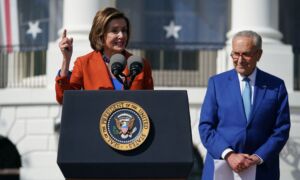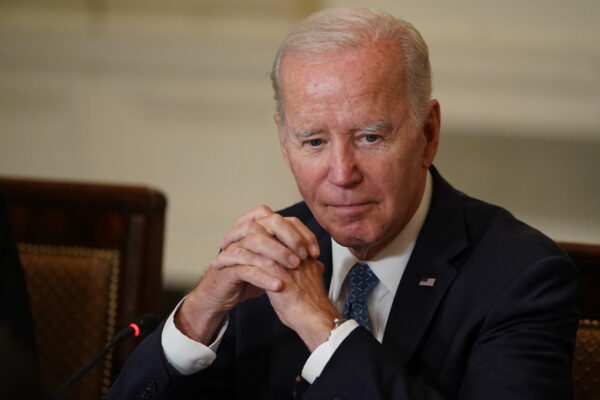Lawmakers Push Biden to Order Screening of US Investments in China
A bipartisan group of U.S. House and Senate lawmakers urged President Joe Biden to issue an executive order to increase the screening of investments by U.S. companies in foreign adversaries, particularly China.An executive order controlling U.S. investment abroad would “safeguard our national security and supply chain resiliency on outbound investments to foreign adversaries,” eight senators wrote in a Sept. 27 letter (pdf) to Biden. Congress has been considering a legislative proposal that would give new powers to the U.S. government to review or block billions of dollars in U.S. outbound investments into China. The proposed legislation, dubbed the National Critical Capabilities Defense Act, was revised in June. Despite strong support, the measure was dealt a setback when it was removed from legislation to subsidize U.S. semiconductor chip manufacturing and research that was approved in August. Although negotiations continue, “American workers, businesses and our national security cannot afford to wait,” reads a statement from House Speaker Nancy Pelosi (D-Calif.), Senate Majority Leader Chuck Schumer (D-N.Y.), Sen. John Cornyn (R-Texas), and other lawmakers. “The pandemic shined a spotlight on just how exposed U.S. supply chains are and the severe cost of relying on foreign adversaries for our Nation’s critical capabilities,” the lawmakers wrote in the letter. The group, which also included Rep. Bill Pascrell (D-N.J.), Rep. Rosa DeLauro (D-Conn.), Sen. Bob Casey (D-Pa.), Rep. Brian Fitzpatrick (R-Pa.), and Rep. Victoria Spartz (R-Ind.), pushed the president to “move forward with executive action” to protect U.S. workers and advance U.S. economic security interests. The White House didn’t respond to a request for comment. U.S. President Joe Biden, shown during the third meeting of the White House Competition Council, in the State Dining Room of the White House on Sept. 26, 2022. (Mandel Ngan/AFP via Getty Images) Government Action ‘Long Overdue’ The Biden administration hasn’t yet made a final decision on a potential mechanism to screen U.S. outbound investment in China, National Security Council official Peter Harrell said earlier this month. “It’s important to consider whether and how certain narrowly targeted categories of U.S. investment in foreign competitor semiconductor firms might undermine the effectiveness of these other policy tools,” Harrell said at an event marking the release of a report on outbound investment measures. However, lawmakers highlighted in the letter that the Chinese regime “has an egregious track record of promoting intellectual property theft and forced technology transfer.” “When we cede our manufacturing power and technological know-how to foreign adversaries, we are hurting our economy, our global competitiveness, American workers, industry, and national security,” the lawmakers wrote. “Government action on this front is long overdue to address the scope and magnitude of these serious risks we face as a country.” ‘World’s Principal IP Infringer’ About 80 percent of all economic espionage prosecutions by the Justice Department allege conduct that would benefit China, the department stated in 2021. An updated IP commission report (pdf), published in 2017 by the National Bureau of Asian Research, estimated that the cost of intellectual property (IP) theft to the U.S. economy could be as high as $600 billion per year. The IP commission called China “the world’s principal IP infringer,” responsible for between 50 percent and almost 90 percent of all IP theft costs at the time of the report. “China continues to obtain American IP from U.S. companies operating inside China, from entities elsewhere in the world, and of course from the United States directly through conventional as well as cyber means,” the IP commission wrote in the report. “These include coercive activities by the state designed to force outright IP transfer or give Chinese entities a better position from which to acquire or steal American IP.” Theft of tech secrets and forced technology transfer were among the reasons that the Trump administration launched its trade war against China in 2018. The Senate Banking Committee will hold a hearing on outbound investment on Sept. 29, featuring testimony from Cornyn, Casey, and former Commerce and Treasury Department officials. It will also feature testimony from Robert Strayer, executive vice president of policy at the Information Technology Industry Council. Reuters and J.M. Phelps contributed to the report. Follow Dorothy Li is a reporter for The Epoch Times based in Europe.

A bipartisan group of U.S. House and Senate lawmakers urged President Joe Biden to issue an executive order to increase the screening of investments by U.S. companies in foreign adversaries, particularly China.
An executive order controlling U.S. investment abroad would “safeguard our national security and supply chain resiliency on outbound investments to foreign adversaries,” eight senators wrote in a Sept. 27 letter (pdf) to Biden.
Congress has been considering a legislative proposal that would give new powers to the U.S. government to review or block billions of dollars in U.S. outbound investments into China. The proposed legislation, dubbed the National Critical Capabilities Defense Act, was revised in June. Despite strong support, the measure was dealt a setback when it was removed from legislation to subsidize U.S. semiconductor chip manufacturing and research that was approved in August.
Although negotiations continue, “American workers, businesses and our national security cannot afford to wait,” reads a statement from House Speaker Nancy Pelosi (D-Calif.), Senate Majority Leader Chuck Schumer (D-N.Y.), Sen. John Cornyn (R-Texas), and other lawmakers.
“The pandemic shined a spotlight on just how exposed U.S. supply chains are and the severe cost of relying on foreign adversaries for our Nation’s critical capabilities,” the lawmakers wrote in the letter.
The group, which also included Rep. Bill Pascrell (D-N.J.), Rep. Rosa DeLauro (D-Conn.), Sen. Bob Casey (D-Pa.), Rep. Brian Fitzpatrick (R-Pa.), and Rep. Victoria Spartz (R-Ind.), pushed the president to “move forward with executive action” to protect U.S. workers and advance U.S. economic security interests.
The White House didn’t respond to a request for comment.

Government Action ‘Long Overdue’
The Biden administration hasn’t yet made a final decision on a potential mechanism to screen U.S. outbound investment in China, National Security Council official Peter Harrell said earlier this month.
“It’s important to consider whether and how certain narrowly targeted categories of U.S. investment in foreign competitor semiconductor firms might undermine the effectiveness of these other policy tools,” Harrell said at an event marking the release of a report on outbound investment measures.
However, lawmakers highlighted in the letter that the Chinese regime “has an egregious track record of promoting intellectual property theft and forced technology transfer.”
“When we cede our manufacturing power and technological know-how to foreign adversaries, we are hurting our economy, our global competitiveness, American workers, industry, and national security,” the lawmakers wrote. “Government action on this front is long overdue to address the scope and magnitude of these serious risks we face as a country.”
‘World’s Principal IP Infringer’
About 80 percent of all economic espionage prosecutions by the Justice Department allege conduct that would benefit China, the department stated in 2021.
An updated IP commission report (pdf), published in 2017 by the National Bureau of Asian Research, estimated that the cost of intellectual property (IP) theft to the U.S. economy could be as high as $600 billion per year.
The IP commission called China “the world’s principal IP infringer,” responsible for between 50 percent and almost 90 percent of all IP theft costs at the time of the report.
“China continues to obtain American IP from U.S. companies operating inside China, from entities elsewhere in the world, and of course from the United States directly through conventional as well as cyber means,” the IP commission wrote in the report. “These include coercive activities by the state designed to force outright IP transfer or give Chinese entities a better position from which to acquire or steal American IP.”
Theft of tech secrets and forced technology transfer were among the reasons that the Trump administration launched its trade war against China in 2018.
The Senate Banking Committee will hold a hearing on outbound investment on Sept. 29, featuring testimony from Cornyn, Casey, and former Commerce and Treasury Department officials. It will also feature testimony from Robert Strayer, executive vice president of policy at the Information Technology Industry Council.
Reuters and J.M. Phelps contributed to the report.













